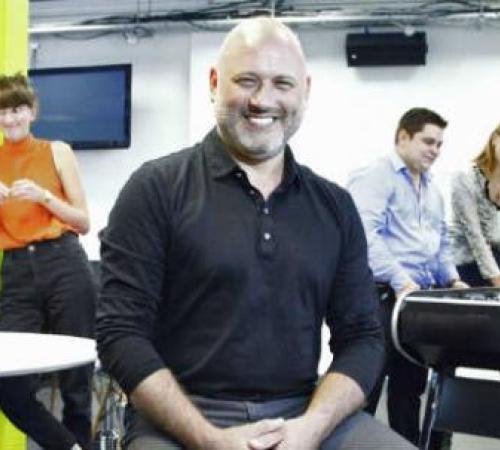
Meet our customer: female founder of Snap Fashion

Could you briefly describe what Snap is and how you came up with the idea?
Snap is a visual search engine for clothing that I started working on ten years ago while I was at Bristol University. The idea is that you take a picture of something you like anywhere, such as in a shop window or a magazine and we’ll find similar clothes to buy online based on colour, texture and shape.
It’s very difficult to describe what attracts you to a particular item of clothing. You can’t always put your finger on why you like an item, so visual search is a really powerful tool; you don’t have to put ideas into words, you can just take the picture as a point of inspiration and go from there.
The idea hasn’t really changed much from the start. I wrote the initial algorithms, got some initial seed finance and put together a small team to get the idea off the ground. Now, there are 12 of us in an office in central London and Bristol, and we’re growing each month.
How did you know the idea was a winner from so early on?
It really came from me sharing the idea with friends and discussing how we’d use it. The more people I told about it, the more wanted to try it – that was when I knew I was on to a good idea.
Then the idea won a business plan competition as part of my degree course. That was a complete surprise, which really made me think that the idea had legs beyond my group of friends, so I kept working on it after I left university.
You had a full-time job for two years before dedicating yourself to developing the app. What finally persuaded you to make the leap?
The market was moving forwards, more people were developing new visual search tools, and I knew that in five years’ time I didn’t want to be still in the same job thinking ‘What if I’d really tried to make a go of Snap Tech?’ Also, I found that my mind would increasingly drift to thinking about Snap Tech during the day, so I came to the conclusion that I had to do it then if I was ever going to do it.
Is it true you entered awards, like the Cisco British Innovation Gateway award, as an alternative means of financing?
I’m a firm believer in raising as little money as possible, because it’s easy for a start-up to get caught up in a circle of venture capital. Obviously, you can’t rely on awards as a source of funding, but I think if you can pick and choose which competitions you think you stand a good chance of winning then it’s a good strategy for bootstrapping a start-up for as long as you can.
The awards also brought us an enormous amount of validation. As an early-stage company with an unproven founder trying to introduce new tech to hopefully drive new behaviour, it was really important for us to have the endorsement of big organisations like Cisco and Innovate UK.
How did your MBE come about and what impact has it had on you and Snap?
I still don’t know who nominated me, but I’m very flattered to have been awarded one. I was really shocked when I received the letter, and it was desperately hard for me not to tell my friends and family straight away, because you’re not allowed to tell anyone for a month.
It’s had a really great impact because as a young, female founder I’ve had a fair amount to prove. So, just as winning the Cisco competition helped to validate the business, the MBE has been a stamp of approval for me.
Has it made you an ambassador for women in tech?
Some people have called me that, which I find quite weird because I see my job as just being to build Snap Tech. I don’t regard myself as being a role model, but then I guess women who want to go into the tech industry, or just young people hoping to set up a business, need to see successful entrepreneurs who can also speak honestly about what it takes to set up a business.
What’s been your biggest mistake?
I think I spent too long wondering whether to stay in my job or to devote myself to setting up Snap Tech. I probably moved too slowly at the beginning: most start-up founders are impatient people who tend to think that the faster you can run then the quicker you can succeed.
What’s been your biggest achievement so far?
I would say raising £2 million in our Series A round of financing was a massive milestone for us. I’m really proud that we were Time Inc.’s first venture capital investment outside of the US.
You’ve said you didn’t set up Snap so you could run your own company or to make a lot of money. So what’s your driving goal?
I want to change the way in which we search. I’m amazed that people still spend so much time tapping away on their tiny phone keyboards when there’s a far more satisfying way to search online. I’m passionate about educating people on the advantages of visual search and trying to be the leader in that technology.
Would you in that case describe yourself as a reluctant CEO?
I don’t think I would have seen myself in this role 10 years ago, but I know that I’m the person with the drive and the passion to push the company forwards, so I guess I’ve naturally fallen into this role.
My management style is definitely very unconventional, because I’m completely focused on how we can improve the product. But I’ve come to realise how much I enjoy being the CEO.
I believe in empowering my team: giving each of them responsibility for driving forwards the development of a particular part of the product. Also, I want to make sure that each of them is growing as fast as the company is, and they feel they are in a fantastic position in which they are still learning.
I’m also trying to do that for myself: we’re a part of Upscale in Tech City [which has put the founders of some of the UK’s fastest-growing tech companies together with mentors who have built and sold businesses], the Royal Academy of Engineer’s SME Leadership programme.
These kind of programmes have given me the opportunity to ask people for advice and to hear from them about maintaining a good work/life balance and to keep on learning. So, hopefully, I’ll grow as a CEO as the company grows.
What’s the biggest challenge you face over the next 12 months?
I think they’re the same as for every start-up founder: finding the right people and the right investors to help you grow the business. It’s a real challenge to attract the best engineers when there are so many good jobs available. We’ve tried to emphasise how interesting it is here: how they’d be working on some crazy and fun cutting-edge engineering projects, not all of which will come off.
I think that challenge and atmosphere attracts a certain type of person, who, like me, probably wouldn’t want to work in a big corporation.
Have you encountered sexism in the tech industry?
I think as a woman it’s something that you can encounter everywhere, but I think that it’s actually harder being a woman in business than being a woman in tech. Perception and authority play a big part in business, and there’s a sense that a woman founder has to work that little bit harder.
But I’ve found that in tech, although the social environment can sometimes be quite testing for women, it’s a wonderful meritocracy in that if you write great code you can get to the top. I think there are probably more female role models in tech than in business, but I think that’s getting better, as people become more aware of the problem.
How would you encourage more women to follow your path into studying computer science at university and pursuing a career in the tech industry?
I think it’s very important to spread a positive message among young girls. Being an engineer or a computer scientist should be put on a par with being a doctor or a vet – the two science-based careers that generally speaking most girls aspire to.
They need to hear more good stories about a career in tech, and for career advisors to suggest to them that they might become a programmer if they study maths and physics at A-level.
What would be your advice for a young woman who has an idea for a killer app?
My advice would be the same for a young woman or man: test it with your friends and don’t invest a fortune getting it to the stage of being a minimum viable product. Do as much of the work as you can yourself and don’t be scared about telling other people – it’s actually takes a lot of effort for someone to steal your idea, and even if they do, you’ll probably still be first to market with it. Only once you’re confident that your idea has legs should you think about speaking to developers and potential investors.
Discover more about Snap Fashion (external link)
Read more in our female founder series:
Female founder of Availexe, a recruitment agency
Female founder of Fearless Futures, a social justice training agency
Female founder of Stage & the City, a performing arts school
Find out more about our business insurance
Disclaimer:
At Hiscox, we want to help your small business thrive. Our blog has many articles you may find relevant and useful as your business grows. But these articles aren’t professional advice. So, to find out more on a subject we cover here, please seek professional assistance.




